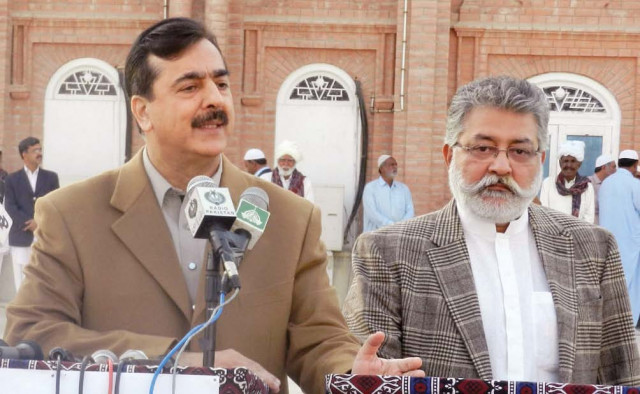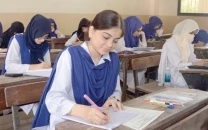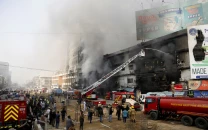Blockade politics: Parliament to decide on NATO supplies, says PM
Country needs civil nuclear technology for energy needs: Gilani.

Before his departure for a nuclear summit in Seoul, the prime minister spared a few minutes to make jibes at the opposition.
At the Chaklala airbase on Sunday morning, Prime Minister Yousaf Raza Gilani, while refuting the opposition’s claims on the suspension of Nato supplies, said that the blockade was the government’s decision and there was no dictation from any side.
Pakistan blocked the Nato supply route after an airstrike on the Salala checkpoint on November 26 killed 24 soldiers.
“If the opposition thinks that we discontinued Nato supplies under their pressure, then they are wrong. We decided to block the supplies after discussing it with the Defence Cabinet Committee.”
A consensus will be evolved among all stakeholders and the decision on whether to reopen the supply routes will be taken by Parliament unanimously, he said. Gilani will represent Pakistan at the second nuclear security summit beginning in Seoul on Monday (today).
Accompanied by Foreign Minister Hina Rabbani Khar and Pakistan’s envoy to the United States Sherry Rehman, the premier reached the South Korean capital later in the day. Gilani said the talks at Seoul’s nuclear summit will focus on how to further protect nuclear weapons.
The prime minister said that in light of the worsening energy crisis, Pakistan needs access to civil nuclear technology. “Demanding civil nuclear technology is not a sin. It’s our requirement.”
He said nuclear technology is important for Pakistan in order to remain at par with India and to promote regional stability.
Talking about his agenda for the meeting with US President Barak Obama, Gilani said that the meeting will be crucial to the future of Pakistan-US ties.
Some 54 leaders from across the world will be in attendance at the moot to discuss nuclear security and safety.
Meanwhile, while talking to media in Seoul, Pakistan’s Ambassador to China and chief negotiator for the summit Masood Khan emphasised that “Pakistan has very successful experience of using nuclear technology for peaceful purposes and generating electricity”.
(With additional input from APP)
Published in The Express Tribune, March 26th, 2012.



















COMMENTS
Comments are moderated and generally will be posted if they are on-topic and not abusive.
For more information, please see our Comments FAQ